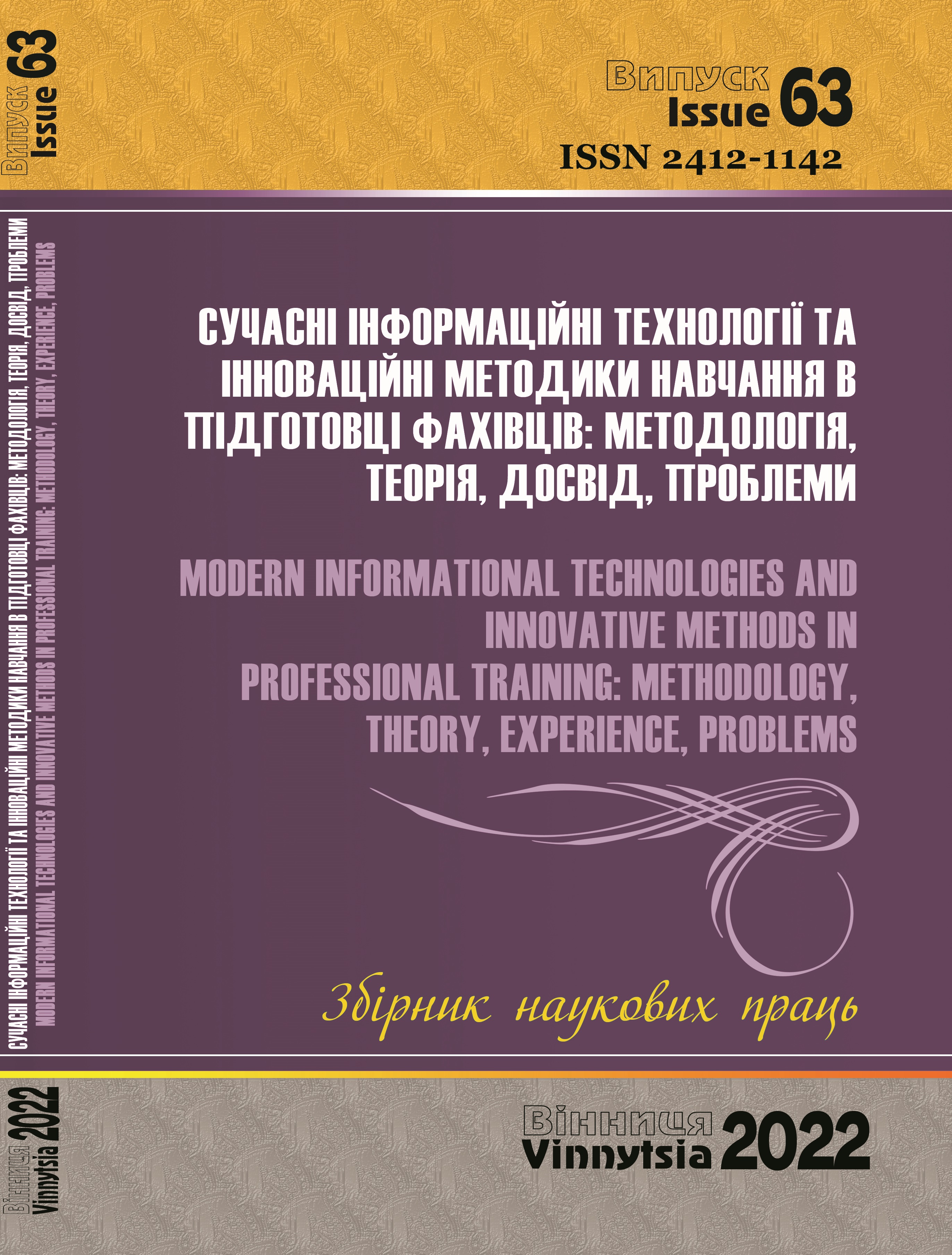DIGITALIZATION AS A PROSPECTIVE DIRECTION OF THE CONTEMPORARY EDUCATION SYSTEM
DOI:
https://doi.org/10.31652/2412-1142-2022-63-65-77Keywords:
digitalization; society digitalization; education digitalization; digital literacy of a contemporary educator; digital competenceAbstract
The issues of digitalization, digitalization of the society and educational environment are
covered. It is investigated that digitalization is aimed at ensuring the longlife learning process, as well as
its individualization on the basis of advanced learning technologies. Digitization of education directly
depends on the level of mastery of educator’s digital awareness which is aimed at making educational
activities up to date and more productive. The scheme of the digital education system is given. The
management of digitalization in the educational environment is carried out through digital marketing, aimed
at organizing the interaction with teaching and support staff, research and teaching staff, graduates,
students, applicants using a range of digital communication channels; monitoring changes in the formation
of a positive image of the educational institution; stimulating the creation of new digital communities and
innovations; development of personalized marketing materials for target audiences. The factors influencing
the digital transformation of educational institutions are considered in the article. It is established that one
of the main elements of education digitalization is digital literacy, which is defined as a set of knowledge
and skills necessary for the safe and effective use of the digital technologies and Internet resources. Based
on the analysis of various sources, digital literacy is based on the digital competence of the educator and is
defined as the willingness and ability to use digital resources, computers, mobile devices and cloud
technologies in the educational process, and to create and effectively use educational digital system
opportunities and all its components in the educational process. The fundamental difference between digital
literacy and digital competence is the inclusion of a component of motivation and responsibility. The types of skills on which digital literacy and its components depend on are highlighted. The main components of
digital competence of educators are listed. The levels of educator’s digital competence are considered and
characterized at the following levels: basic, advanced and proficient.
Downloads
References
Жук Ю. О., Соколюк О. М. Характерні ознаки структури комп’ютерно орієнтованого навчального
середовища. Інформаційні технології і засоби навчання : зб. наук. праць / за ред. В. Ю. Бикова, Ю. О. Жука
/ Інститут засобів навчання АПН України. К. : Атіка, 2005. С. 100–109.
Digital Education Action Plan 2021-2027. Resetting education and training for the digital age / Communication
From the Commission to the European Parliament, the Council, the European Economic and Social Committee
and the Committee of the Regions, COM(2020) 624 final. Brussels, 30.9.2020. URL:
https://eurlex.europa.eu/legal-content/EN/TXT/?uri=CELEX:52020DC0624/ (last access: 22.08.2021).
2030 Digital Compass: the European Way for the Digital Decade / Communication From the Commission to the
European Parliament, the Council, the European Economic and Social Committee and the Committee of the
Regions, , com/2021/118 final, Brussels, 9.3.2021. URL: https://eur-lex.europa.eu/legalcontent/en/TXT/
?uri=CELEX%3A52021DC0118 (last access: 22.08.2021).
Краус К.М. Імперативи формування цифрової освіти в Україні. URL: http://dspace.puet.edu.ua/
bitstream/123456789/6059/1/%D0%9A%D1%80% D0% B0%D1%83%D1%81%20%D0 %9A.%D0%9C.pdf
Морзе Н.В., Кучеровська В.О., Смирнова-Трибульська Є.М. Самооцінювання рівня цифровізації
освітнього закладу за умов трансформації середньої освіти. Електронне наукове фахове видання «Відкрите
освітнє е-середовище сучасного університету», (8), 72-87. URL: https://doi.org/10.28925/2414-0325.2020.8.8
Биков В.Ю., Буров О.Ю. Цифрове навчальне середовище: нові технології та вимоги до здобувачів знань.
Сучасні інформаційні технології та інноваційні методики навчання в підготовці фахівців, методологія,
теорія, досвід, проблеми : Збірник наукових праць. Вінниця : ТОВ «Друк плюс», 2020. Вип. 55. С.11-22.
Гриценчук О. О. Стратегічні орієнтири розвитку інформаційних освітніх мереж ЮНЕСКО та ЮНІСЕФ в
європейському контексті. URL: http://194.44.242.244/e-journals/ITZN/em1/content/06goonec.html
Gurevych, R. S., Shakhina, I. Y., & Podzygun, O. A. (2020). Google Сlassroom as an effective tool of smart
learning and monitoring of students’ knowledge in vocational schools. Information Technologies and Learning
Tools, 79(5), 59-72. https://doi.org/10.33407/itlt.v79i5.3651
Bykov, V. Y., & Leshchenko, M. P. (2016). Цифрова гуманістична педагогіка: актуальні проблеми
педагогічних досліджень у галузі використання ІКТ в освіті. Інформаційні технології і засоби навчання,
(3), 1-17. https://doi.org/10.33407/itlt.v53i3.1417
Гаврілова Л. Г., Топольник Я.В. Цифрова культура, грамотність, цифрова компетентність як сучасні
освітні феномени. URL: http://www.irbis_nbuv.gov.ua/bin/irbis_nbuv/cgiirbis_= 2&I21DBN=UJRN&P21
DBN=UJRN&IMAGE_FILE_DOWNLOAD=1&Image_file_name=PDF/ITZN_2017_61_5_3.pdf
Осадча Л. А. Психологічні особливості впровадження та використання цифрових технологій в освітніх
процесах. Цифрові технології в освітніх і наукових процесах Іnternаtіоnаl Scіentіfіc Jоurnаl «Іnternаukа».
Губеладзе, І. Г., Яцишин, А. В., & Сухіх, А. С. (2021). Роль цифрових технологій у формуванні почуття
власності молодого вченого. Інформаційні технології і засоби навчання, 85(5), 304-322.
https://doi.org/10.33407/itlt.v85i5.4533
Petrova A., Podzygun O. (2018) Implementation of information and communication technologies in teaching a
foreign language for professional communication. Professional competency of modern specialists: means of
formation, development and improvement : monograph. Warsaw: BMT Erida Sp. z. o. o., 2018, p. 424. P. 163-177.
https://www.academia.edu/41734993/Professional_competency_of_modern_specialist_means_of_formation_de
velopment_and_improvement?pop_sutd
Дмітренко Н., Петрова А., Подзигун О. (2021). Особливості використання електронного посібника з
англійської мови для професійного спілкування майбутніх учителів математики й інформацітики. Сучасні
інформаційні технології та інноваційні методики навчання у підготовці фахівців: методологія, теорія,
досвід, проблеми : збірник наукових праць. Вінниця : ТОВ «Друк плюс», 2021. Вип. 60. C. 200-
DOI: https://doi.org/10.31652/2412-1142-2021-60-1-465
Тимофєєва І. Б. Упровадження цифрових технологій у підготовку молодих педагогів. Інформаційно-
комунікаційні технології в освіті. Вип. 11. Т. 3. 2019. URL: http://www.innov pedagogy.od.ua/archives/2019/11/part 3/44.pdf
Gilster P. Digital Literacy. New York : Wiley, 1997. 276 p.
Спірін, О. М. (2013). Критерії та показники якості інформаційно-комунікаційних технологій
навчання. Інформаційні технології та засоби навчання , 33 (1). https://doi.org/10.33407/itlt.v33i1.788
Шахіна І. Ю., Остаповець А. С. Роль цифрових технологій у підготовці майбутнього педагога
професійного навчання. International scientific innovations in human life. The 5 th International scientific and
practical conference “International scientific innovations in human life” (November 17-19, 2021) Cognum
Publishing House, Manchester, United Kingdom. 2021. pр. 508-512.
Assessing Educators' Digital Competence. Proposal for a European Framework for the Digital Competence of
Educators (DigCompEdu) URL: https://ec.europa.eu/jrc/sites/jrcsh/files/digcompedu_overview_-_english.pdf(дата звернення: 20.02/2021)
Downloads
Published
Issue
Section
License
Copyright (c) 2022 Ірина Шахіна, Олена Подзигун, Анастасія Петрова, Галина Гордійчук

This work is licensed under a Creative Commons Attribution 4.0 International License.

